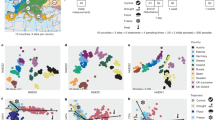Abstract
THE importance of a knowledge of the effect of temperature on the metabolic activities of the soil microflora can scarcely be questioned, especially in the case of tropical soils. Furthermore, the temperature characteristic of the metabolic activities calculated by the Arrhenius's law: V = exp(−μ/RT), where V is the rate of the process, R the gas constant and T the absolute temperature, may be considered as the activation energy of the slowest or ‘pacemaking’ process in the chain of enzymatic mechanisms1. In this case it would be possible to use this method as a kinetic analysis of the slowest enzymatic processes in the metabolism of the soil microflora.
This is a preview of subscription content, access via your institution
Access options
Subscribe to this journal
Receive 51 print issues and online access
$199.00 per year
only $3.90 per issue
Buy this article
- Purchase on SpringerLink
- Instant access to the full article PDF.
USD 39.95
Prices may be subject to local taxes which are calculated during checkout
Similar content being viewed by others
References
Crozier, W. J., J. Gen. Physiol., 123, 136 (1924).
Lees, H., Plant and Soil, 2, 123 (1949).
Author information
Authors and Affiliations
Rights and permissions
About this article
Cite this article
LAUDELOUT, H., MEYER, J. Temperature Characteristics of the Microflora of Central African Soils. Nature 168, 791 (1951). https://doi.org/10.1038/168791a0
Issue date:
DOI: https://doi.org/10.1038/168791a0



